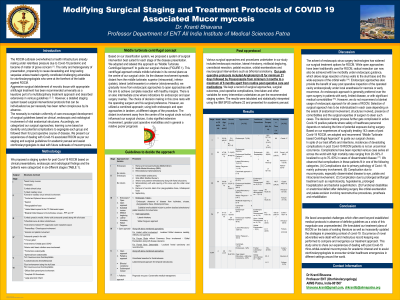Rhinology/Allergy
(317) Modifying Surgical Staging and Treatment Protocols of COVID19 Associated Mucormycosis
Monday, October 2, 2023
2:45 PM - 3:45 PM East Coast USA Time

Has Audio

Kranti Bhavana, MS, DNB
Professor Otorhinolaryngology
All India Institute of Medical Sciences Patna
Patna, Bihar, India
Presenting Author(s)
Disclosure(s):
Kranti Bhavana, MS, DNB: No relevant relationships to disclose.
Introduction: The second wave of the COVID-19 pandemic was associated with an upsurge in the incidence of rhino-orbital-cerebral mucormycosis (ROCM) cases. The absence of standardized surgical management protocols and guidelines was a significant impediment to the efforts of otorhinolaryngologists at the forefront of the battle
Methods: Our main aim was to develop a clinical staging system for post-Covid-19 ROCM based on presentations, and endoscopic and radiological findings. This study also intended to propose a staging-based system of surgical intervention for post-Covid-19 ROCM.
The study design was an observational study. It was conducted on patients operated on between May 2021 to August 2021. The study was made on patients suffering from COVID-19-associated mucormycosis (CAM) who underwent surgical debridement using either an endoscopic or open surgical approach. All patients were operated on under a multi-disciplinary approach at All India Institute of Medical Sciences Patna. All these patients were staged according to their severity and surgical debridement was done using an either endoscopic or open approach. the outcomes measured were cured, revision or failure.
Results: 143 cases of post-Covid-19 ROCM were surgically treated as per proposed guidelines with an overall cure rate of 79.72% (114 patients). Revision surgery was called for in 13 patients (9.09%) whereas 16 patients (11.18%) succumbed to the disease. A categorical evaluation revealed an increased necessity for open and multidisciplinary procedures and worse morbidity and mortality rates with increasing stages of our proposed classification.
Conclusions: Modifying the staging protocol can make the treatment approach methodical and protocol based. The treatment of mucormycosis still lacks a protocol-based approach. Our staging system not only incorporates the lacunae of many of the currently prevalent classification systems but also incorporates stage wise optimal management to ensure satisfactory outcomes.
